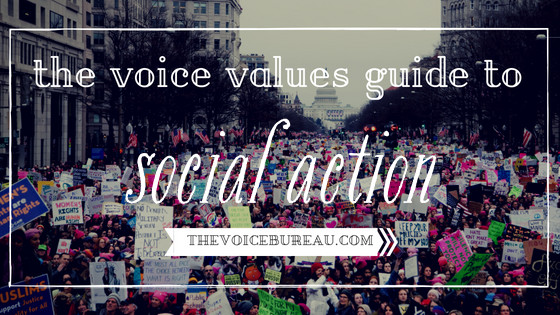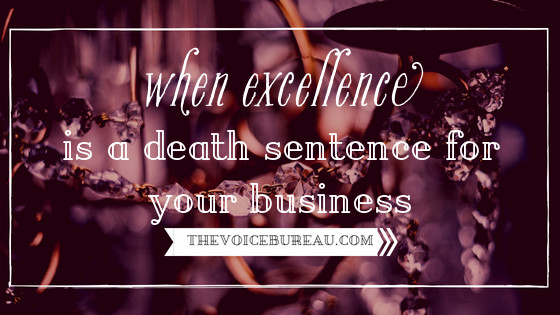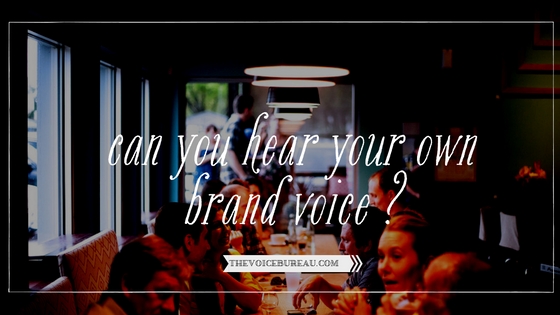 When we talk about Voice Values, it’s usually all about writing.
When we talk about Voice Values, it’s usually all about writing.
We’re generally speaking about how you approach copy for business, and how best to help you connect with your Right Person. The Voice Values serve a role in marketing that keeps your brand conversation authentic, because they’re all about what matters most to you, as a person and as a business.
But, much like any personality typing system, they can be applied to so much more than what language you choose to use in your writing. And, given some events happening in the world right now, we thought it useful to share something a little bit different — a Voice Values Guide to Social Action.
Depending on your strengths and your personal preferences, certain forms of activism might make you deeply uncomfortable, and it’s possible that you’re going to feel guilty about not doing all the things.
That’s not saying that you should outright avoid doing something because it makes you uncomfortable — you can be sure people who are impacted by unfair and exploitative policies are much more uncomfortable than you are — but there’s a place for everyone, and it’s very possible that the person who is right at home screaming protest chants in a crowd is horrified by the thought of correcting every incorrect fact being spewed on Facebook (and vice versa). If you focus on what you are good at, you can still make a huge difference, minus the guilt and discomfort.
Because we live in the United States, this guide is written with our own government and our current situation in mind, but it’s certainly applicable to other countries and their own concerns. Keep in mind that you’ll need to look into codes and laws if you’re planning anything, regardless of where you live — I don’t pretend to know the legality of organizing a protest one state over, let alone how to run for office in Tanzania.
A note: When you’re seeking out the most effective action, it’s best not to reinvent the wheel. Generally speaking, unless you see a clear gap that’s not being covered, supporting existing organizations is going to be more effective than starting your own. (Sorry, high Innovation folks.) Of course, if no one is doing what needs to be done, step up! But keep in mind that existing charities and social action organizations already have systems in place to handle things like donations and legal concerns, and your efforts will go much farther if you don’t have to figure out all of those issues on top of actually supporting your cause.
And so, without further ado, the Voice Values Guide to Social Action.
[Not sure of your Voice Values? You can sign up to take the quiz for free here.]
Accuracy
There is a lot of false information out there (fake news, if you will), and your natural instinct is to put it right. Whether it’s a questionable Facebook post or your racist uncle’s conspiracy theories, the facts are on your side, so don’t be afraid to speak up when you come across something that’s incorrect — or head to Google if something feels questionable but you’re not entirely sure. Just be careful that you’re applying your truth filter to both sides — even if you agree with the sentiment, it’s worth making sure the information being shared is correct. It may not make you the most popular person on your Facebook friends list, but the truth is worth protecting.
Audacity
Oh, Audacity. “Go big or go home” could be your mantra. You are the ones climbing monuments and projecting giant signs onto buildings, but don’t be afraid to make your grand gesture a little closer to home. Consider what you can do to make a big impact on a smaller scale — staging a protest, leading a walk, punching a Nazi. (I kid. Mostly.) The one caveat for you is to be sure you’re not operating in a bubble. You can get wrapped up in making the biggest statement, the most memorable sign, but you may need another set of eyes to be sure your statement is clear — and not undermining your cause overall.
Clarity
I’m fortunate to have several lawyers as friends, so when I’m unpacking the news and start to get bogged down in the implications and legalities and specifics, I have someone to ask. This lawyer may or may not be you, but chances are, you’re the one seeking out articles that explain what’s going on, in uncomplicated, easily accessible terms. There’s so much going on that can be difficult to understand (even for the lawyers!), but you can help bring some simplicity to all of it, and share that with people who might not otherwise understand. Because understanding the news — and what it means for all of us — is absolutely crucial in developing a plan for making things right.
Community
Community action is an obvious fit for you, so don’t be afraid to gather your people and get to work. Start a fundraiser. Plan a protest. Join the campaign team for a political candidate who champions the ideals you support. Creating and organizing groups is second nature to you, and having the power of numbers is so important in enacting change. You can make a difference on a national — or even global — scale, but don’t get discouraged if you tend to work better up close and personal. Real, lasting change starts within our own communities, and you’re uniquely suited to build those groups, whether it’s a nation-spanning organization or a small but active kaffeeklatsch within your neighborhood.
Depth
Never one to skim the headlines, your understanding of the news is complex and so much more expansive than most. Help others to see the ways these stories are connected, the recurring characters whose actions ripple through months’ worth of news. Not all of us spring for the New York Times subscription, so call out those misleading headlines — you’re not likely to get everyone to dedicate the sort of time you do to really understanding what’s going on in the news, but you can help them avoid falling into the trap of getting their news from six-word snippets. (Be aware — for them and for you — that news burnout is a very real thing. It’s okay to take a step back if you find yourself diving too deep.)
Enthusiasm
As someone with a high Enthusiasm value, you’re likely to burn out a lot slower than others. While your friends may be ready to hole up in a wifi-free cave in the mountains somewhere, you’re looking for the next rally. It’s important to understand that people need to take care of themselves, and sometimes that looks like disengaging for a bit. But in the long run, it’s perseverance and commitment that are going to succeed in enacting change, and you’re the perfect person to keep up the levels of enthusiasm and rally the troops. Share your passion and get others excited to join in with you.
Excellence
No one would ever expect to see you waving a hastily penned sign at a protest. For those with a high Excellence value, the most important thing is to do something right or not at all. So apply those talents to areas where a level of polish is going to help win minds. Volunteer to design a website for a grassroots candidate whose graphic design team leaves something to be desired. Write a really compelling script to share with concerned citizens looking to call their senators and representatives. Organize an event that others have struggled to manage. If your other Voice Values lie in Depth, Accuracy, Clarity, or Transparency, you might consider writing an article or even an opinion piece — flawlessly researched, with several rounds of revisions and copyedits, of course — that helps people better understand and act on a subject that’s especially important to you.
Helpfulness
There are so many areas where those with a high Helpfulness value can be of service, it can be hard to know where to start. You might help people register to vote or organize a ride share on election day. Start a fundraiser or volunteer with an organization supporting human rights. Find ways to support those in your community who are directly impacted by regressive policies, providing food or other necessities to those who can’t afford them or organizing access to free or low-cost clinics to those unable to get health insurance. Pick a cause that’s particularly weighing on your mind, seek out the organizations working on them directly (Google basically has you covered here), and ask them how you can help. Chances are, they’ll have plenty for you to do.
Innovation
Clearly, the way we’re doing things right now isn’t working. And that’s where you come in — whether you’re petitioning for the elimination of the Electoral College, creating a new app to help people get out and vote, or championing social change in calls to your representatives, your forward-thinking nature means that change is your thing. You may even be a good fit to run for office — a progressive platform is appealing to more and more voters today, and all those policy suggestions you’ve been doodling in the margins of your notebooks could be the foundation for some seriously impactful bills.
Intimacy
With a high Intimacy value, your strengths lie in the personal, but this can also be your weakness. When the news is full of sobbing children missing their parents and communities without power or clean water, it hits you, hard. Take care of yourself. Take frequent breaks. Laugh whenever you can. And then use this empathy that you so naturally feel and focus on bringing about change on a personal level to the people who need it right now. Rather than trying to solve the problems of the world, sponsor a single family. Reach out to your friends and make sure that everyone in your circle votes. Look to a friend who is Muslim or Mexican or trans or a member of any other group impacted by these regressive policies and make sure they’re okay, and ask what you can do to help support them. Call your representatives and tell them what you expect from them. Frequently. You may not make headline news, but the difference you can make for a single person could mean absolutely everything.
Legacy
They say those ignorant of history are doomed to repeat it, and no one knows this better than the Legacy keepers. Keep an eye out for trends that mimic history, and call it out — online, to your friends, to anyone who will listen — whenever you spot a troubling trajectory. Can we learn from our past mistakes? Only someone who really understands them can say. On the other side of your personality, you’re interested in the legacy we’ll be leaving for future generations — and not just what side of history we’ll be shown on in the school books of our grandchildren. You’re likely to find particular satisfaction working on environmental causes, since a poisoned, flooded world is no inheritance to leave our children. Whether you’re protesting deep sea drilling or donating to wildlife preservation groups, there are plenty of ways to get involved.
Love
Love is such a hard value to have in these times. Empathy is in your nature, and it can be painful to see people suffer. Your work is in supporting them, and allowing your love to set the example that these are human beings in need, not just statistics — or worse. Your empathy can be infectious, so try to inspire others to join you, whether than means collecting donations or petition signatures or gathering together an actual group of volunteers to get to work, hands-on. Unless you’re on the receiving end of a serious trust fund, it’s unlikely your charitable donations can keep up with your heart. That’s okay. Allow yourself to be okay with not providing financial support to every cause that tugs at your heartstrings, and find other ways to share your love with the people who are hurting most. Focus on humanitarian efforts, and find out how your particular strengths can fill in the gaps of what’s needed.
Playfulness
It may feel like Playfulness has no part in serious matters, but satire has been an effective tool in combating inequality and corruption for pretty much as long as we’ve had language. Think about political cartoons or, more recently, a certain large orange baby flying over England. You don’t need an in-depth analysis of policy to make a difference — sometimes, you just need something to grab someone’s attention. You don’t necessarily need to be the one to spearhead the entire project, but maybe there’s an upcoming rally or a publication that you can join up with and add a dose of satire. Maybe you just have a really clever sign to hold at a protest. That’s still important — hold that sign up high and know there’s a very good chance someone with a camera is going to be sharing it with the world later.
Power
Run for office. I’m serious. A high Power value doesn’t necessarily mean you’re “power-hungry,” but it does mean you’re well-suited to being in charge. And if you’re standing on a set of values that you can champion in office, get out there and do it. It doesn’t matter if you’re running for school board, city council, or senate, strong leadership at every level is what we need to make real, systemic change happen. (But if you have no political experience, maybe avoid running for President, yeah?) Not interested in holding office? Maybe you’re better suited to leading an activist group, managing operations for a charity, or running a campaign for someone who does want to take that seat. Hold your elected officials accountable. Whatever your preferred role, your natural aptitude and capacity to get stuff done are sure to make a difference.
Security
Security can be tough value to hold in uncertain times, and you may struggle to see how you can make a difference. Look closely at efforts to preserve the social safety net — universal health care; welfare and housing support; high-quality, free public education — and seek out organizations that you can support, either financially or by volunteering your time and skills. If you have financial aptitude, you might consider teaching a local class on saving for retirement or paying off debt — issues many lower-income individuals face that are compounded by an uncertain social security outlook. You can also stand as a voice of reason when fears can work people into a frenzy. If possible, defuse the situation by highlighting the protections we do have, and help them find ways to safeguard their own families.
Transparency
In a political climate defined by lies and misdirection, the role of transparency is absolutely crucial. You may not personally have access to behind-the-scenes secrets, but you can definitely boost the signal of those who do — sharing articles, social media posts, or other reports that reveal actions some might prefer to hide, or holding it up on a big sign at a protest or march. Make sure that back-room deals are brought to light in any way you can, and you may sway some opinions — or light a fire under politically neutral people who might not be as diligent in seeking out these secrets. There are many watchdog groups who could use your support, on topics from fair elections to corporate environmental violations. As the Washington Post says, “Democracy Dies in Darkness.” But not on your watch.
Regardless of your strengths, the most important way to support social action is to act. Whether you’re protesting in the streets, posting on Facebook, or spearheading a community network, remember that you are contributing to a much larger movement, and together, our tiny little actions can make a difference. (And VOTE, for the love of god.)
In the comments, I’d love to hear:
What causes are nearest to your heart? Do you currently support any activism?
{ 1 comment }




 Hello, you.
Hello, you.